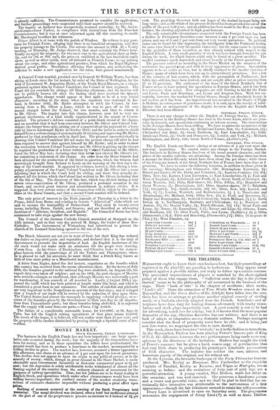The Dutch labourers are not yet in want of food;
but their King has reduced the duties on imported grain and vegetables, and declared that it is the duty of Government to promote the importation of food. An English landowner of the old stock would not make such an admission till the people were starving, if even then. As his Grace of Buckingham and Chandos looks to his stained- glass lantern with the quarterings of all the Tudors and Plantagenets, whom he is pleased to call his ancestors, he mast think that a Dutch Kai' g knows as little of true state policy as a Manchester manufacturer.
A letter from Naples, dated the 3rd instant, expatiates on the benefits which this country has received from the recent alterations there. By the decree of July 30th, the bounties granted to the national flag were abolished; on August 5th, the export duty-was taken off sulphur; and on the 18th, the port-charges of Messina were revised—charges so exorbitant, that although Messina was universally a port for warehousing, it was scarcely at all resorted to. Lastly, (August 29th,) ap- peared the tariff, which has been printed at length under this head, and which is considered a great boon to our commerce. The articles of cod-fish and pilchards are very important to the Neapolitans on account of the fast-days; and it is hoped that a branch of our trade will be revived by the reduction of duty upon them. The United States had almost the monopoly in supplying colonial produce, on ac- count of the bounties given by the Government to their own flag on all importa- tions from Transatlantic ports; but these bounties being abolished, it is expected that the supply will come from our ports.—Times, City Article.
The failure of a considerable mercantile house, for 150,0001., at St. Jago de Cuba, has left the English mining speculators of that place minus 25,0001. The assets of the house, it is believed, will not realize more than 25 per cent ; and the property will be further diminished by passing through a Spanish court of law. -esidmi-


























 Previous page
Previous page